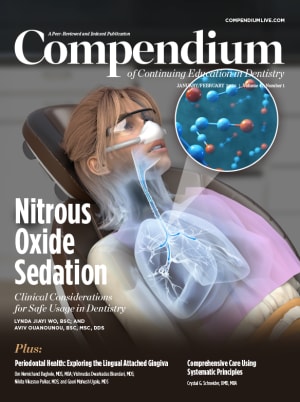Being Ever Vigilant
For edentulous patients, a population that continues to increase, dental implants can be a godsend for their long-term oral and overall health.
As dentists-and, increasingly, patients-know, there is a lot to like about dental implants. Since coming into vogue in recent decades and more lately undergoing one groundbreaking innovation after another, dental implants have grown in popularity thanks largely to high success rates, long-lasting reliability, and the natural look and comfortable fit they provide. On top of this, implants help people chew and eat better and can even improve one's facial and bone features. For edentulous patients, a population that continues to increase, dental implants can be a godsend for their long-term oral and overall health.
Yet even with the high success and survival rates and the boon that dental implants have enjoyed, there remains a need for both clinicians and patients to stay vigilant in their treatment and care of these surgically placed artificial devices. With implants rising in numbers worldwide, and with the oral cavity abundant in bacteria, peri-implant disease is lurking, and just like with natural dentition, there is no substitute for careful, consistent oral hygiene measures for implant patients. Moreover, implant maintenance along with ongoing peri-implant supportive therapy becomes all the more important.
Our continuing education (CE) lineup this month features two articles focused on the care and preservation of dental implants and the prevention and treatment of peri-implantitis. The first CE article reviews current implant maintenance protocols and various approaches to peri-implant therapy. It describes etiologic factors of peri-implant diseases, key assessments that should be included in maintenance visits, and treatment techniques, both nonsurgical and surgical. The authors encourage personalized regimens in peri-implant care to promote favorable long-term outcomes.
In our other CE article, the authors discuss the evolution of implant therapy as well as complications, including mechanical and biological, that can arise from implant placement while investigating the efficacy of antimicrobial use in implant therapy both prophylactically and postoperatively.
In essence, implant placement is just the beginning of the edentulous patient's journey. Meticulous care and upkeep throughout the lifespan of the implant-from patient and practitioner alike-is necessary to ensure a healthy, enduring tooth substitute. With proper maintenance, dental implant patients should be able to experience oral health to the fullest.
Sincerely,
Markus B. Blatz, DMD, PhD
Editor-in-Chief
markus.blatz@conexiant.com
